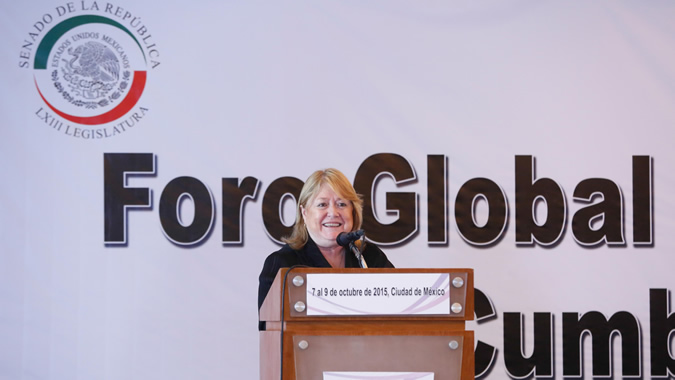News
It is undeniable that since the first World Conference on Women held in this city 40 years ago, there has been progress on gender equality. Nonetheless, despite increased participation, the low level of women’s representation in politics, economy and other general spheres of power continues to be alarming. Without the contribution of women, decisions do not reflect the interests of the peoples; they are not democratic and therefore are illegitimate.
We have made progress, but much less than what was expected and needed. The review of the Beijing Action Plan, spearheaded by the Secretary-General of the United Nations, was exceptionally welcome, with response from 167 countries. Nevertheless, the results show that, unfortunately, we are far from achieving our initial goals in all areas.
To provide a picture of the situation, I’ll mention that only 14 of the 193 Heads of Government of the United Nations Member States are women. That is a 7,3%. Only 17% of the ministers of government of the world are women. And, as we know, women barely represent a 22,3% in parliaments. Well below the gender balance established as a goal in Beijing.
PERSONAL STATISTICS
We must recognize that, if we were to re-open the Beijing agenda today into a Beijing+20, many of the proposed goals would risk being reviewed for the worse, not for the better. There is a dangerous trend against the accomplished achievements and, moreover, questions the deepening of the commitments to achieve the physical, political and economic autonomy. It is important to be alert to these signs of regression and prevent them from happening. This is demonstrated in the recent deliberations by the Commission on the Status of Women.
Of course, we must look beyond these numbers to assess the impact and the results of legislation and policies on women and girls. This is why the timing of this Forum is so appropriate, just a few days after the adoption of the 2030 Agenda for Sustainable Development, which includes the individual objective of gender equality and women’s empowerment. Moreover, the 2030 Agenda, which includes gender equality in all of its objectives, offers a new opportunity for prioritizing these topics in the political agenda.
From the gender equality point-of-view, the 17 Sustainable Development Goals (SDG) represent a significant step forward from the Millennium Development Goals. The SDGs include the gender perspective as a fundamental component to understand situations concerning poverty, hunger, health, education, clean water and sanitation, employment, the reduction of inequality between and within countries, safe cities and peace and security issues worldwide.
The 2030 Agenda presents serious challenges for the next 15 years, but it is also a great opportunity. To take advantage of this opportunity towards the deepening and the acceleration of women’s participation in decision-making it takes a broad and comprehensive approach, and women parliamentarians should play a fundamental role.
They can, for example, work to prepare parliaments for the demand that will entail the implementation, monitoring and review of the SDGs, including SDG 5 on gender equality.
Women parliamentarians can create or participate in SDG committees, constituted with gender balance amongst its members and in its leadership, for the establishment of adequate access to data and investigations to gender-related issues. The data and results from investigations will allow the creation of corresponding legal frameworks and securing necessary funding.
We know that inclusion calls for tackling complex inequality, and that gender discrimination is just one of other forms of disadvantages: socioeconomic, geographic, race, cast or ethnicity, sexuality or different forms of impairments; and all of them mix and match to diminish opportunities for women and girls. To counter these inequalities, it is necessary to prioritize those women and girls to whom it is more difficult to reach and those who, at the same time, are in high-risk situations. To do so, we need more dissociated data, more information regarding the impact of discrimination against the rights of different groups of women and the design of appropriate responses through laws, policies and programmes.
We need more investment in data generation through the bolstering of statistics offices and of different gender equality mechanisms. To design appropriate responses we need to know how poverty affects different groups of women, we need data on income distribution, on women’s non-remunerated employment, on women’s participation in decision-making processes and on gender violence. In this sense, the commitment of Parliaments will be essential in ensuring that we have solid measurement mechanisms that include gender as an essential qualifier, translating these results into adequate legislation.
The last forty years have given us many lessons. Opportunities like this Forum are essential to keep discussing options and defining concrete ways of action towards the future.
It is undeniable that these acts have to be encouraged by everyone. Men’s commitment to this agenda is fundamental. The “He for She” campaign driven by UN Women is an attestation to this fact. The same goes for the pictures located outside with men-leaders that encourage this idea.
I am sure that interaction and commitment will allow us to accelerate development in the path to gender equality for the benefit of humanity.
Thank you.



